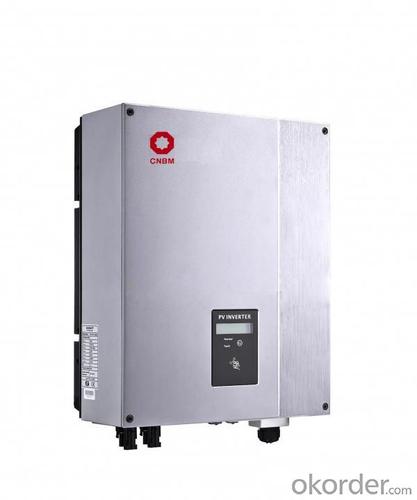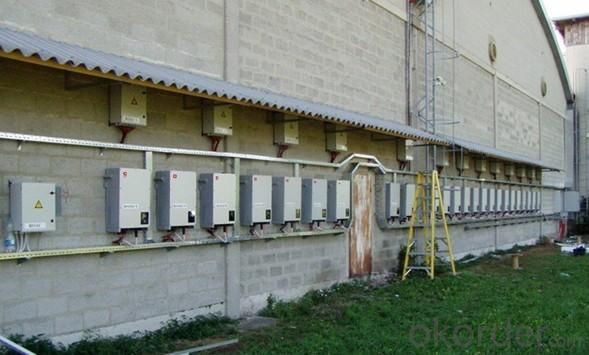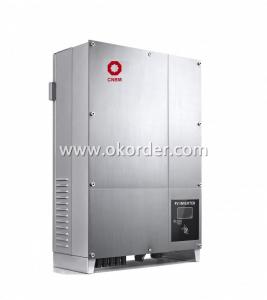Marine Solar Inverter CNBM-3000MTL Gird Tied
- Loading Port:
- Shenzhen
- Payment Terms:
- TT
- Min Order Qty:
- 1 set set
- Supply Capability:
- 3000 per month set/month
OKorder Service Pledge
OKorder Financial Service
You Might Also Like
Features of Grid Tied Solar Inverter CNBM-3000MTL
CNBM International Corporation (CNBM International) is the most important trading platform of CNBM Group Corporation, a state-owned company under the direct supervision of State-owned Assets Supervision and Administration Commission of the State Council.
The Grid Connected Solar Inverter we can offer is 1.5kw to 20kw.
Introduction of Grid Connected Solar Inverter CNBM-3000MTL
Maximum efficiency of 97.8% and wide input voltage range
Integrated DC switch-disconnected
MTL-String
Sound control
Bluetooth/RF technology /Wi-Fi
Transformerless GT topology
5 years warranty (10 years as optional)
Technical data of Grid Tied Solar Inverter CNBM-3000MTL
Model | CNBM-2500MTL | CNBM-3000MTL | |
Input data (DC) |
|
| |
Max. DC power | 2700W | 3200W | |
Max. DC voltage | 500V | 500V | |
Start voltage | 150V | 150V | |
PV voltage range | 100V-500V | 100V-500V | |
Max. input current | 10A | 10A | |
Number of MPP trackers /strings per MPP tracker | 2/1 | 2/1 | |
Output (AC) |
| ||
Rated AC output power | 2500W | 3000W | |
Max. AC power | 2500W | 3000W | |
Max. output current | 12.5A | 15A | |
Power factor | 1 | 1 | |
THDI | <3% | <3% | |
AC connection | Single phase | Single phase | |
Efficiency |
| ||
Max. efficiency | 97.5% | 97.5% | |
Euro weighted efficiency | 97% | 97.4% | |
MPPT efficiency | 99.5% | 99.5% | |
Protection devices |
| ||
Output over voltage protection-varistor | yes | yes | |
Ground fault monitoring | yes | yes | |
Grid monitoring | yes | yes | |
General Data |
| ||
Dimensions (W / H / D) in mm | 360/421/152 | 360/421/152 | |
Weight | 15.6KG | 15.6KG | |
Operating temperature range | –30°C ... +60°C | –30°C ... +60°C | |
Altitude | 2000m(6560ft) without derating | ||
Self-Consumption night | < 0.5 W | < 0.5 W | |
Topology | Transformerless | ||
Cooling concept | Natural | Natural | |
Environmental Protection Rating | IP65 | IP65 | |
Features |
| ||
DC connection | H4/MC4(opt) | H4/MC4(opt) | |
Display | LCD | LCD | |
Interfaces: RS485/RS232/Bluetooth / RF/Zigbee/Wifi | yes/yes/opt/opt/opt | ||
Warranty: 5 years / 10 years | yes /opt | ||
Certificates and approvals | CE、VDE 0126-1-1、DK5940、G83/1-1、G59/2、RD1663、EN50438、 VDE-AR-N4105、CEI-021、IEC-62109、ENEL-Guide | ||
CNBM-3000MTL is simple national setting of line supply monitoring, Easy country configuration, with Multi-language,display, currently available for most of the countries over the world.With technical creativity and scientific management, the factory established first class R&D and test centers, as well as management and R&D teams comprising of PhDs and masters with overseas qualification.
Figure 1 the application of Grid Tied Solar Inverter CNBM-3000MTL
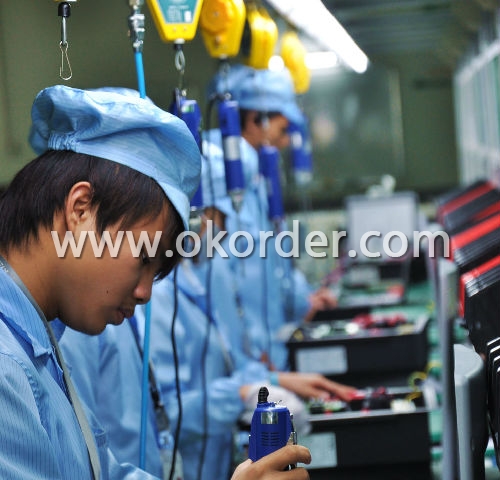
Figure 2 the application of Grid Tied Solar Inverter CNBM-3000MTL
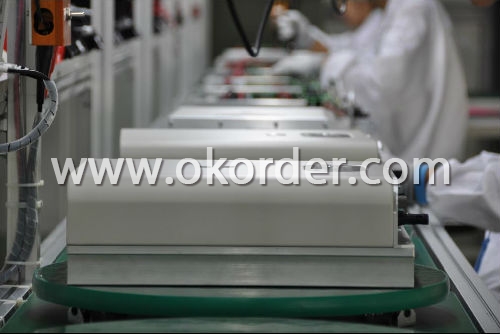
- Q: Can a solar inverter be connected to the grid?
- Yes, a solar inverter can be connected to the grid. In fact, this is one of the main purposes of a solar inverter – to convert the direct current (DC) electricity generated by solar panels into alternating current (AC) electricity that can be used in homes and businesses or fed back into the grid. Connecting a solar inverter to the grid allows for the utilization of solar energy while also providing the opportunity to sell excess power back to the grid, contributing to renewable energy generation and potentially offsetting electricity costs.
- Q: Can a solar inverter be upgraded or expanded?
- Yes, a solar inverter can be upgraded or expanded. Upgrades can involve increasing the capacity or efficiency of the existing inverter, while expansion typically refers to adding more inverters to the system to accommodate additional solar panels or increase the overall energy output. However, it is important to consult with a professional to ensure compatibility and proper integration with the existing solar power system.
- Q: What is the role of a synchronization circuit in a solar inverter?
- The role of a synchronization circuit in a solar inverter is to ensure that the inverter's output voltage and frequency are synchronized with the utility grid. This is important for two reasons. Firstly, it allows the solar inverter to safely connect and disconnect from the grid, ensuring smooth and seamless operation. Secondly, it enables the solar inverter to inject electricity generated from solar panels into the grid at the correct voltage and frequency, making it compatible with other electrical devices and systems connected to the grid.
- Q: Can a solar inverter be controlled remotely?
- Indeed, remote control of a solar inverter is possible. Numerous contemporary solar inverters are furnished with integrated communication capabilities like Wi-Fi or Ethernet connectivity, granting the ability to monitor and control them from a distance. Users can access and manage their solar inverters from any location with an internet connection through a web-based interface or a dedicated mobile app. The remote control features typically encompass performance monitoring, settings adjustment, and issue troubleshooting. This remote control functionality provides solar system owners with convenience and flexibility, empowering them to maximize energy production and efficiently manage their systems.
- Q: How does a solar inverter ensure safety during maintenance?
- A solar inverter ensures safety during maintenance by automatically disconnecting the system from the grid and de-energizing the circuits. This prevents any potential electrical shocks or accidents while the maintenance personnel work on the system.
- Q: What are the different power output modes of a solar inverter?
- The different power output modes of a solar inverter include grid-tied mode, off-grid mode, and hybrid mode. In grid-tied mode, the solar inverter synchronizes with the utility grid, allowing excess solar energy to be fed back into the grid. In off-grid mode, the inverter operates independently, powering electrical loads directly from solar energy and often utilizing batteries for energy storage. Hybrid mode combines both grid-tied and off-grid functionality, allowing the inverter to switch between grid-connected and standalone operation as needed.
- Q: What is the role of a grid protection relay in a solar inverter?
- The role of a grid protection relay in a solar inverter is to monitor the electrical grid and protect against any abnormalities or faults that may occur. It ensures the safe and reliable operation of the solar inverter by detecting and isolating faults such as overvoltage, undervoltage, overfrequency, underfrequency, and other grid disturbances. The grid protection relay acts as a safeguard, preventing any damage to the solar inverter and maintaining the stability of the grid connection.
- Q: Can a solar inverter be used with solar-powered emergency backup systems?
- Yes, a solar inverter can be used with solar-powered emergency backup systems. The solar inverter is an essential component that converts the DC (direct current) power generated by the solar panels into AC (alternating current) power, which can be used to power various electrical devices and appliances during emergencies.
- Q: Can a solar inverter be used with solar-powered electric fences?
- Yes, a solar inverter can be used with solar-powered electric fences. A solar inverter is responsible for converting the direct current (DC) generated by solar panels into alternating current (AC) that can be used to power various devices, including electric fences. This allows for an efficient and sustainable solution to power electric fences using solar energy.
- Q: Can a solar inverter be installed indoors?
- Yes, a solar inverter can be installed indoors.
Send your message to us
Marine Solar Inverter CNBM-3000MTL Gird Tied
- Loading Port:
- Shenzhen
- Payment Terms:
- TT
- Min Order Qty:
- 1 set set
- Supply Capability:
- 3000 per month set/month
OKorder Service Pledge
OKorder Financial Service
Similar products
Hot products
Hot Searches
Related keywords



